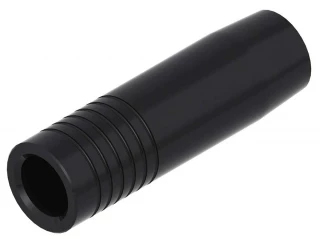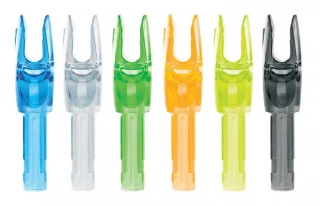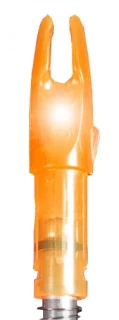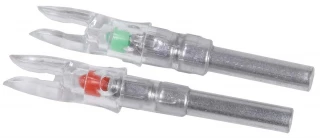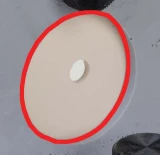3Rivers Gasket Lacquer Arrow Finish Review
Featured Deal

From $27.99
Get Deal3Rivers Gasket Lacquer Arrow Finish
Gasket lacquer is specially formulated for use with gasket systems, such as the Speed Coat Dipper Cap Kit or Eco-Dipper. With these systems, 3Rivers Gasket Lacquer dries in seconds. Two coats for satin finish, three coats for a gloss, and four coats gives a high gloss finish. Three coats can be applied on a dozen shafts in about 20 minutes. It is recommended to let the shafts cure for 24 hours before cresting. For the beginner or professional arrow builder. Low fumes and no mess. We recommend fletching with Nitrocellulose, Duco cement, or Bohning Fletching Tape. ...read more
$27.99
$19.59
$25.19
3Rivers Gasket Lacquer Arrow Finish For Sale
Most Popular Arrow Building
Gold Tip Ballistic Collar System
Reinforce your Gold Tip Traditional Classic and Traditional Classic XT carbon arrows... read more
Black Eagle M Micro-Nocks (dozen)
The Black Eagle "M" Micro-Nock is 100% Polycarbonate. Sturdy and dependable, it's... read more
Burt Coyote Lumenok® Lighted Push-In Nocks
All new HD Orange! 30% brighter than previous models. Featuring new and... read more
NOCKturnal™ Lighted Push-In Nocks
The NOCKturnal™ lighted nock is a breakthrough design that is more affordable... read more
Goat Tuff Impact Glue
Bowhunters and target shooters expect a lot from their arrows. That's why... read more
3Rivers Gasket Lacquer Arrow Finish Reviews
Good sealer
Seals the arrows good I found it takes about 4 coats to get a real good smooth finish bohning fletching tape seems to stick to it really well
I would buy this product again.
Used it as a clear seal over my dipped a crested cedar arrows.
Top Knotch Product
Great product, easy to use.
Longevity
In October 2009 I purshased a pro dipper, with the rubber gasket squeegee system. Additionally I purchased a can of 3rivers gasket lacquer. I sealed a dozen POC shafts that same month. Then I capped the pro dipper with the lacquer and stored it in my basement. Fast forward to May 6, 2015; i.e 5 years 7 months later. I re-opened and re-dipped another dozen shafts. The lacquer is… read more still good, it went on smooth and dried just as fast as it did 5 years ago. I've been travelling a lot and just have not had the time to make as many arrows as I would like. The only reason I give this product 4 stars is that I have not tried any other kind of shaft sealer, so I don't have a sense of how well this product works relative to the other options. That being said, for the hobbyist arrow-smith just looking to make enough shafts to drill targets in the backyard/hunt with something hand crafted, I think this lacquer is about as fool-proof as it gets.
Gasket laquer
I used it with the gasket. it works perfectly. Before you know it you have a dozen arrows with 4 coats of laquer. the only down fall (im being picky) is that if you dip 1 end and turn the shaft around and immediately dip the other end to finish the place your hand was holding, it ripples. but that's if you do it immediately. just dip one end on all 12 then go back and do the other… read more side.
Great stuff
This is a great finish, no smell, has a great hard finish, and drys fast for multipule coats. I use it in-doors with no adverse effects
New Formula
I emailed 3R ten days before ordering asking about the "New" designation. Is this a reformulation? Does this address the problems with cracking and crazing that showed up last year in the Gasket Lacquer? After not receiving an answer, I decided to risk the $20 and find out for myself. Pleasantly surprised. On the third coat you get a nice high gloss finish of the proper thickness,… read more and when left to cure for 24 hours is very hard. No need for further coats with this formula so plan your cresting accordingly.
Superior finish
I purchased this to use with the big dipper dip tube and the speed coat gasket kit and I could not be more pleased. I would not recommend this product without the eco dipper or gasket system because its way to thick to dip without some sort of gasket to wipe away the excess. The finish is superior to anything I have used and it is super tough, it even holds up to repeated use in… read more 3D targets. Its so simple to use and it dries in minutes. You have to experiment a little with the speed that you withdraw the shaft from the gasket to get the best coverage, the faster you pull the shaft the thicker the lacquer coat will be, if you pull it too fast you may get runs. The shafts in the picture are Douglas Fir coated using gasket lacquer and crested with Whispering Wind cresting paint. I applied the 3 rivers oil based stain, let dry for 24 hours, applied 4 coats of gasket lacquer, let it dry for a few hours, crested, let dry for 24 hours, then add 2 more coats and hit them with some steel wool to dull the finish for hunting. I used the recommended Duco cement for the fletching and it worked very well. This is hands down the best shaft sealing system I have ever used!!
Use 4 coats, not 3
I have been using gasket lacquer with the Eco Dipper for several years. 4 coats will give you the best hard glassy finish. after 3 coats I could still feel the grain through the finish. 4 coats will add about 18 grains to a full length 23/64 shaft. this is the most durable finish I have ever used, and the residue from 3D targets sticks to it less than any other finish. what… read more does stick is easy to clean up. for hunting arrows, I buffed the shafts with #0000 steel wool, fletched them, then sprayed with clear matte acrylic finsh to eliminate glare. this product is highly recommended.
Nice finish
I have used this product along with the dipping tube to seel dozens of arrows and it does a great job
3Rivers Gasket Lacquer Arrow Finish Questions and Answers
I currently use this Gasket Lacquer to seal my arrows. I stain my arrows with the 3Rivers Alcohol Based Arrow Stain (Mohave Red & Harvest Gold). The issue I am having is that the Gasket Lacquer starts to change color to red or gold depending on which stai
The stain has to thoroughly dry or you will run the risk of having this problem. After I have left them dry I wipe and/or rub the shaft with a clean lint free cloth.
My experience is to just use the lacquer with the tint it gets, it doesn't effect the look of the finished arrow, unless you are sealing over white. M Cawelti
I tend to use a few different colors for my shafts and mark each can clear and whatever color I was using. the lacquer lasts a while and if the clear is tinted with a particular color just use it the next time you use the color.
Andrew, I do not have an answer to this one. I had used gasket lacquer successfully on and off for 5 or 6 years. Previously the only issue I had was in damp/cold weather when it would become milky when dry. That said with my last purchase of gasket lacquer this past summer I too experienced the color bleeding into the lacquer (despite using the same dyes as previously & in some cases two weeks dry time). I threw out the better part of a quart. Although it is a pain because of dry-times I now use only True Oil or, preferably, a marine varnish known as Le Tonkinois. In the case of the latter I had a mahogany arrow recovered after nearly a year in a swampy stream bed and the finish (and shaft) had held up and I'm still shooting it after re-fletching. Not the answer you were looking for probably but I will never again spend money on Gasket Laquer.
Hate to say it. Same problem. I stopped using it. I had been thinning the lacquer as directed. But in separate jars. Seemed to work ok. I dealt with it. Until I spent a day in the woods removing it from my arrows with my thumbnail.
There is really nothing you can do to keep alcohol stain from tinting gasket laquer. I take paper towel and wipe the shafts down before dipping them. Even after days of drying time you will still be able to wipe off a lot of residue. It does not hurt the laquer, so you do not need to through it away. I keep 2 dip tubes full. One that I use with my alcohol stained shafts and one for non stained shafts. Your other option is to go with a water based stain which will not tint your laquer at all and if you do any cresting or cap dipping also does not bleed through when gluing your feathers on. I use both alcohol and 2ater based stain. They both work well. Water based has less negative effects but is sometimes hard to get the color you want. I hope this helps. Sent from my U.S. Cellular® Smartphone
How long will this quart last after opening? I have a quart I used from 2 or 3 years ago
can cresting tape be used on top of this sealer? Thx Joe
Yes you should be able to use cresting tape over the top of this sealer.
Yes, I've used the cresting tape with the laquer and it works great.
Do you have to stain wood arrows? Or can the raw natural shaft be sealed with this product and preform fine?
You do not have to stain the shafts if you do not want to. The Gasket Lacquer works either way.
YES You can seal unstained wood
Jesse, I never stain my cedar shafts, and always use the gasket lacquer with great results. I use 0000 steel wool to sand the shafts after the first coat, then add 3 or more coats to achieve the gloss I want. Gene Gordner Custom Guns LLC 646 S. Foys Lake Dr. Kalispell, Mt 59901 www.customrifles.us
you do NOT have to stain (this is a color choice of each archer) nor do you have to seal; but it is advisable since it protects the shaft from moisture. and gasket lacquer is my preference. I stain and seal with a clear coat. ANDREW . . .
Can I apply this directly over crest and crown paint once it is dry, or do I need to apply something else before hand?
I prefer to crest over the Lacquer and feel that I get better results this way.
I prefer to crest after applying it.
I have only used it to dip arrows that were stained and cap dipped not crested. It leached some of the stain out of the wood and into the tube of lacquer but the cap dip paint was not affected. Jimmy Sent from my Verizon, Samsung Galaxy smartphone
Hi Jacob, I've used the gasket lacquer. I however, have not gotten that far along yet. I would think it would be fine but I'd run a quick test first. Just slap some paint that you use for the cresting or caps and after it dries - run some gasket lacquer over it. See how it holds up. Pulling the shaft through a gasket with lacquer might make it smear or bleed (it shouldn't if the crest paint is dry/depending on the type of crest paint you use) but you never know. Sorry, I hop this helps. I will be cresting a few myself in a week or two. I'll know more at that time. I'm going to use the Waverly acrylic paint that I bought at Wal-Mart. 8.0z jars at a reasonable price. Best of luck Dwight
I apply it over cresting with no problem. I like it much better than the lacquer I used to use. It's much faster to use and doesn't run you out of the room, when opened.
What paints and stains will be best to use BEFORE using this product to seal arrows?
Most important is to allow the stain to thoroughly dry before applying the lacquer. I prefer water based.
One more note about using alcohol stain. It will also tint your dipping lacquer. Sent from my U.S. Cellular® Smartphone
I use the colored gasket lacquer I do the shafts within 2 hours and after dipping them into the clear ... the shafts look fantastic... there is a pink hue to the clear, but since the shafts are red anyway, no problem. hope this helps
You can use alcohol or water based stain. Just a warning, if you are crown dipping or cresting the alcohol stains may blead through when the glue reacts to it. You will have no problem with a water based stain doing that. As far as paint goes for cresting it will need to be applied after you dip the arrows otherwise it will bleed into the wood. You can use pretty much any cresting paint for this. I use water based and then go back and put a final dip over top of it to seal it in. Water based is the only cresting paint you can do this with. Other based paints will react to the dip and blead Sent from my U.S. Cellular® Smartphone
I've used several different dyes and stains they all worked pretty good, just make sure there throughly dry before dipping them in the gasket lacquer. the gasket lacquer may get slightly tinted by the stain or dye. It didn't affect the end finish of my arrows at all. Good luck Justin
Does this product require a thinner? Brand? Thanks.
This product does not require a thinner.
this product comes ready to use but if this product becomes thick you can use acetone to thin it out if it becomes to thick.
The clear doesn’t require a thinner when first poured, but I have used Acetone to thin it back to original condition after sitting in dip tubes for a long time. I can’t speak to the tinted lacquer.
The lacquer requires no thinner. It's very thick, but dries in about 10 seconds when applied with the Dipping reservoir. One can will last a long time. It should cover several hundred arrows when applied with the Big Dipper dipping reservoir. I apply 3 coats to each arrow. I typically will build 12 arrows at a time. When I'm ready to lacquer, I go straight down the line from one arrow to the next. When the last arrow is dipped, I immediately start over with the first until they've all been dipped 3 times. Give them a few hours before aggressive handling, but dry to the touch in just a few seconds. Good product! Mark Clinton, Oklahoma Disclaimer: This electronic message may contain information that is Confidential or legally privileged. It is intended only for the use of the individual(s) and entity named in the message. If you are not an intended recipient of this message, please notify the sender immediately and delete the material from your computer. Do not deliver, distribute or copy this message and do not disclose its contents or take any action in reliance on the information it contains.
The instructions on the can say that Gasket Lacquer can be thinned with acetone if necessary. However I used it straight from the can with an Eco-Dipper to coat shafts without any thinning.
I do not use a thinner. Sent from my iPhone
This lacquer really works great and saves a lot of time. Brand shown in picture. Worked fine without thinner, but I added acetone and think it works better that way on wood arrows. Less likely to leave a splotch on the shaft. Not an expert, just my opinion.
I currently use this Gasket Lacquer to seal my arrows. I stain my arrows with the 3Rivers Alcohol Based Arrow Stain (Mohave Red & Harvest Gold). The issue I am having is that the Gasket Lacquer starts to change color to red or gold depending on which stai
The stain has to thoroughly dry or you will run the risk of having this problem. After I have left them dry I wipe and/or rub the shaft with a clean lint free cloth.
My experience is to just use the lacquer with the tint it gets, it doesn't effect the look of the finished arrow, unless you are sealing over white. M Cawelti
I tend to use a few different colors for my shafts and mark each can clear and whatever color I was using. the lacquer lasts a while and if the clear is tinted with a particular color just use it the next time you use the color.
Andrew, I do not have an answer to this one. I had used gasket lacquer successfully on and off for 5 or 6 years. Previously the only issue I had was in damp/cold weather when it would become milky when dry. That said with my last purchase of gasket lacquer this past summer I too experienced the color bleeding into the lacquer (despite using the same dyes as previously & in some cases two weeks dry time). I threw out the better part of a quart. Although it is a pain because of dry-times I now use only True Oil or, preferably, a marine varnish known as Le Tonkinois. In the case of the latter I had a mahogany arrow recovered after nearly a year in a swampy stream bed and the finish (and shaft) had held up and I'm still shooting it after re-fletching. Not the answer you were looking for probably but I will never again spend money on Gasket Laquer.
Hate to say it. Same problem. I stopped using it. I had been thinning the lacquer as directed. But in separate jars. Seemed to work ok. I dealt with it. Until I spent a day in the woods removing it from my arrows with my thumbnail.
There is really nothing you can do to keep alcohol stain from tinting gasket laquer. I take paper towel and wipe the shafts down before dipping them. Even after days of drying time you will still be able to wipe off a lot of residue. It does not hurt the laquer, so you do not need to through it away. I keep 2 dip tubes full. One that I use with my alcohol stained shafts and one for non stained shafts. Your other option is to go with a water based stain which will not tint your laquer at all and if you do any cresting or cap dipping also does not bleed through when gluing your feathers on. I use both alcohol and 2ater based stain. They both work well. Water based has less negative effects but is sometimes hard to get the color you want. I hope this helps. Sent from my U.S. Cellular® Smartphone
How may quarts of Fleth Lac are need to fill Big Dipper??
One quart is all that is needed.
One
only one fills it to top.
Less than one. I was able to fill it up and still have some left over.
Approximately how many arrows will a quart do?
Anywhere from 100 to 300 arrow shafts it depends on how thick you put the lacquer on
I have dipped about 4 dozen arrows using the 'Big Dipper' and i dip each shaft 4 times. I have used about 1/2 of a quart so far. After knowing this, I would guess that you could dip roughly 80-100 arrows at 4 dips per shaft. The condition of the gaskets being used tend to have a large effect on usage. I have noticed the older the gasket, the more coating is left on the shaft after each pull.
Can I apply paint prior to sealing my shafts using gasket lacquer without the paint smearing or running?
I would not recommend to paint or crest the shaft before sealing because it can smear the paint as well as contaminate your lacquer for future arrows.
Yes you can,,I've been doing for years,,you have to make sure the paint is completely dry,,I go over it with 0000 fine steel wool,,then make sure it is all wiped clean before sealing.
I made a half dozen green shafted arrows and painted on top of the stain let it dry over night then laquered the shafts and they didn't run or smear. I cannot for the life of me remember if I used oil based or water based paint. I would suggest an experimenting on a shaft just to be safe.




